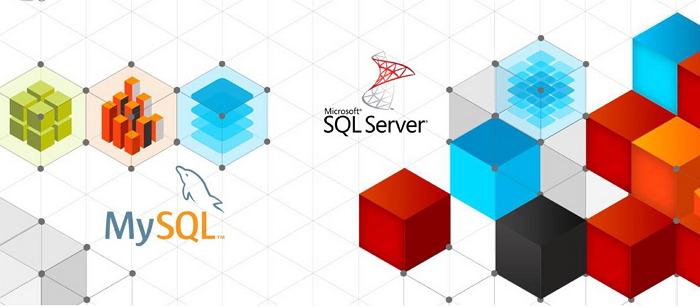SQL, short for structured query language, is the language of relational databases for creating, reading, updating and deleting back-end data. Several relational database management systems (RDBMS) make use of SQL statements but they slightly vary from each other. However, as the database not only stores, retrieves as well as secures all your applications’ data; that saying, your choice of the database system will determine what’s the core of your dynamic content that you’re going to create, you should be very careful of your decision.
Microsoft SQL and MySQL are the most widely-used database systems and many people find it difficult to decide which one is right for their projects. Here’s a look at both similarities and differences between MS SQL Server and MySQL.

Similarities
SQL Server and MySQL have much in common that makes them easy for database developers to work on both RDBMS efficiently, even if they specialize in only one.
Scalability—Both SQL Server and MySQL let you scale as with the growth of your business. Namely, they not only are suitable for small projects, but also support enterprise-level missions that handle millions of transactions per day.
Performance—The efficiency of your database dealing with the data significantly impacts your website or application’ performance. Fortunately, both database platforms can give quite fast speed experience, meaning that they can return data within a second.
Supported Programming Languages—Both SQL Server and MySQL support PHP, Java, C++, C#, Ruby, Visual Basic, Python, R, Node.js, and Delphi. The support for so many programming languages makes the two RDBMS popular among developer communities.
Popularity—Both SQL Server and MySQL are well-known among web application developers. That’s also the reason why most hosting providers offer the choice between the two options when you sign up for a hosting service.
Differences
Environment—SQL Server was originally developed by Microsoft and used to run on Windows operating system exclusively. Microsoft recently announced Linux and Mac OS X support for SQL Server. On the other side, MySQL is owned by Oracle and can work with almost all popular operating systems. Additionally, MySQL supports more programming languages like Tcl, Scheme, Perl, Haskel, and Eiffel.
Storage Engine—SQL Server makes use of a non-transactional storage engine developed by Microsoft to store data, while MySQL supports various options in addition to a plugin storage engine. In other words, MySQL developers can benefit from more flexibility because they are allowed to use different storage engines for different tables on the basis of speed, reliability and so on.
Filtering—SQL Server allows developers to benefit from row-based filtering to filter data on a database by database way and store the filtered data in a separate distribution database. On the other side, MySQL filters out rows, users, and tables in various ways but by individual databases, hence developers need to run multiple queries when filtering the data.
Security—Both SQL Server and MySQL are EC2 compliant therefore being able to store your data in a secure manner. But Microsoft SQL Server has been equipped with state-of-the-art security features that are privately owned by Microsoft itself. For example, Microsoft Baseline Security Analyzer has promised high security for the SQL Server.
Editions—SQL Server is available in multiple editions, such as Enterprise, Standard, Web, Workgroup, or Express. As well, MySQL comes with three main variations, including MySQL Standard Edition, MySQL Enterprise Edition, and MySQL Cluster Grade Edition.
Cost—SQL Server is developed and owned by Microsoft; in other words, you need to buy a license if you want to run a database on SQL Server. In contrast, MySQL is a complete open-source solution and uses the General Public License (GNU), so it is free to use.
Query Cancellation—SQL Server enables for stopping query execution, while MySQL doesn’t allow query cancellation mid-way in the process. SQL Server also slightly wins out over MySQL in making use of a transactional engine to ensure the state consistency.
IDE Tools—Both SQL Server and MySQL support different IDE tools to offer a cohesive environment for development. SQL Server utilizes Management Studio while MySQL has Enterprise Manager, with which you can connect to the server and manage settings & configurations for table design, architecture, and security.
How to Choose?
Your decision on using SQL Server or MySQL to help store your website data should depend on your hosting environment. MySQL databases are usually offered within Linux hosting plans while SQL Server is the best choice for software running on a Windows operating system. Though some Windows hosting providers give you access to MySQL option, we recommend you to use SQL Server since it works natively with .NET applications. And as with Microsoft announced the compatibility of SQL Server with Linux, you can leverage the power of the RDBMS even using Node.js, PHP and other programming languages.
Still looking for the best SQL Server hosting to have effective storage and handle your company or business’ important data? Host4ASP.NET is ready to meet your needs without burdening you with high prices.





